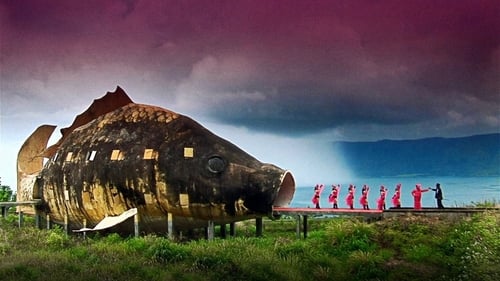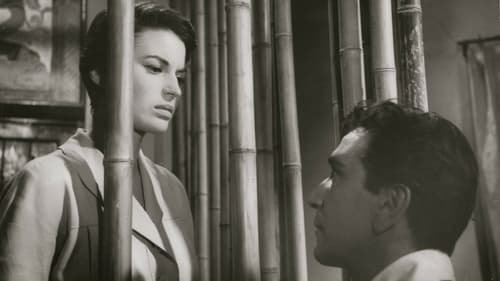Amorira (1932)
Gênero : Drama
Runtime : 2H 15M
Director : Simon Buis
Sinopse
Christian mission propaganda film about 'a slice of heathen life, with the bamboo bush people of Borado-Likowali'. Keli is forced to marry Wesa but has a lover in another village. This causes war to break out between the two villages and Wesa is killed. Wesa's father Meo now wants Keli to marry his other son. Keli refuses and the hostilities continue. Just when the authorities have locked up a number of troublemakers, Father Jacobs arrives. The missionary tries to win the confidence of the locals but becomes embroiled in the conflict. An assault by Meo's men leaves him dangerously wounded. The villagers stop fighting and Meo asks the dying missionary's forgiveness.

Australian journalist Guy Hamilton travels to Indonesia to cover civil strife in 1965. There—on the eve of an attempted coup—he befriends a Chinese Australian photographer with a deep connection to and vast knowledge of the Indonesian people, and also falls in love with a British national.

Num país onde os assassinos são celebrados como heróis, o realizador e a sua equipa desafiaram os líderes impenitentes dos esquadrões da morte a encenar o seu papel no genocídio. O resultado alucinante é um delirante sonho cinematográfico, um mergulho perturbador nas profundezas da imaginação de assassinos em massa e no chocante regime de corrupção e impunidade banais em que vivem.

Twenty-year-old Joseph and his sixteen-year-old sister Suzanne live in the merciless conditions of an intemperate foreign land with their widowed mother. Their mother attempts to exert a hold on her children by involving them in the family's run-down rice plantation. However the siblings seek liberation, and look for this in their romantic lives. Suzanne becomes involved with Michael and Joseph finds a love interest in Claude.

The film weaves around four stories all happening in metropolitan, dehumanizing Jakarta. In fact that is what it is about, the quality of meaninglessness of living in a place that turns people into zombies. In a place where meaning must be invented, these kids turn into the only place, the only culture they see worth tuning into: television and movies. Thus they slowly degenerate into the abysmal reinterpretation in a sort of sickening anti-hero, anti-social statements that goes absurdly a wrong turn.

After meeting at a party, two Indonesian students studying in the US embark on a project to create a science fiction epic that will captivate the masses.

Kenny Wells é um homem americano que tem como sonho mudar de vida. Ele é apresentado ao mundo do Ouro por um geologista picareta que acredita que o pulo do gato será uma viagem para a Indonésia, onde, em uma floresta inóspita, eles encontrariam grandes reservas do metal precioso. O que parecia irreal acaba acontecendo, mas eles vão descobrir que manter o ouro com eles e fugir de ferozes inimigos que querem barrar seus negócios em Wall Street vai ser uma tarefa muito mais complicada do que eles preveram.

Chihiro is depressed and obsessed with his own mortality. Him and his wife, Yuri (Yoko Mitsuya), decide to take a trip to Bali, Indonesia to see his pregnant sister, Kumi (Kiki Sugino). They hope the trip can bring about change.

An evil witch kidnaps people and turns them into zombies. Two young warriors, a pretty girl and an old master fight against the witch and her helpers / monsters.

After the destructions that where caused by the tsunami, the insulars of an Indian archipelago are rolled over by another surge of ruination: the flood of international aid organizations, which pluck this premodern civilisation into the 21st century. The film depicts the partially heroic attempts of the Nicobareses, to live in this world without drowning.

Two weeks after the bombing of Hiroshima and Nagasaki, in August 1945, Indonesian Independence leaders proclaimed “Indonesia Merdeka!” ‘Freedom for Indonesia’ and an end to Dutch colonial rule over the Netherlands East Indies. Internationally renowned Dutch filmmaker Joris Ivens, in Australia as Film Commissioner for the Netherlands East Indies government in exile, resigned his position in protest against Dutch policy, which sought to re-impose its colonial rule. In collaboration with Indonesian activists, Chinese, Indian and Australian trade unionists, and local artists and filmmakers, Ivens made Indonesia Calling, a film documenting the crucial role of Australian trade union support in the establishment of the new Republic of Indonesia. Ivens’ film was an activist documentary; it actively contributed to the events it depicted. All those who worked on it became ‘adversely known’ to the security services.

Darman, his daughter Ida, and Slamet the servant, go into the woods to hunt. Ida was lost when Darman and Slamet are chasing a tiger. Ida ends up in Tarsan's hut. They become close though at first, Tarsan has problems speaking the Indonesian language. Then he agrees to go to the city and learn how to be an urbanite. It is not easy as he is even harassed by Ida’s friends who do not like him.

Feelings slowly grow between an eccentric writer and an aspiring painter until circumstances — and other people — cause them both to drift away.

Eight young people from various reasons and motives coincidentally rob a bank at the same time. They had to work together to find answers to the puzzles, and find the best solution for all.

From Cinehound user Kothar: "Two Girls, Mayang and Sekarsari, are trained by an old master. One day her teacher told them that they were adopted by him. 'Your real parents were killed years ago as Gobang also known as Lowo Ijo, was attacked with his men their village and almost all the inhabitants were murdered.' Mayang and Sekarsari want to find Gobang and take revenge for the death of their parents. They receive from their teacher special swords. He also warns Mayang her sword must not fall into the hands of another person. If it is violated by their own sword, she would immediately paralyzed."

The people of a small Indonesian village believe they have an evil creature called an Impaktita living among them.

Linda is a young woman of Chinese heritage whose mother converted to Christianity after gaining some fame as a badminton player. Her friend Cahyono is tired of anti-Chinese prejudice and now tells people he’s from Japan. Together, they try to make sense of their place in the Indonesian society.

While working on a project together, two friends face the feelings they've long had for each other. Now, however, they're both seeing other people.

Released directly to video, this action film features John Phillip Law as Ted Barner, a low-level employee of a corporation in Indonesia who is charged with testing a new laser weapon. Accompanied by an engineer who works for the corporation and a friend, Barner heads out to the test site with the laser in tow. Before the three can get very far, they must outrun an evil Texas industrialist who intends to grab the laser for himself. They are joined by a female reporter and end up at the site of the test, where their problems are just beginning.

A dramatisation of the struggles of Sheikh Haji Muhammad Saleh, known as Tuanku Tambusai (Tuanku, an honorific; Tambusai, a nameplace), against the Dutch colonialists (and their factional traditionalist Sumatran collaborators) in Sumatra, during the Padri (Priest, the Dutch moniker for Muslim scholars) Wars of the 1830s. Tuanku Tambusai is officially honored as one of the National Heroes of Indonesia for his part in Indonesian history.

Denias lives at the foot of Jayawijaya Mountains. He goes to school in a cottage on the hill run by Pak Guru (or Teacher), who comes from Java. Pak Guru convinces Denias to continue his education because he believes that the boy is clever and could become a mathematician. Maleo the soldier also encourages Denias to go across the mountain where a good school lies. Then Denias goes on a 10-day expedition to find the school all by himself. His sleeping bag washes away in the river and he also passes out of exhaustion. Then he has to struggle to be accepted in the school as the Freeport Company that owns it, only allows children of the chiefs or the nearest tribes to be admitted.











